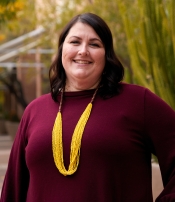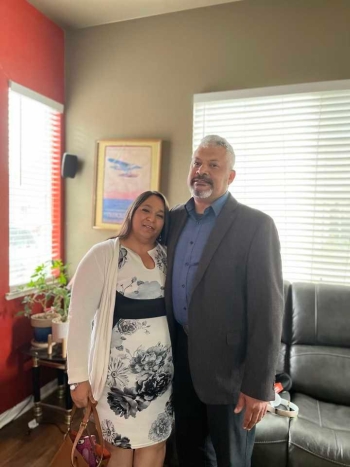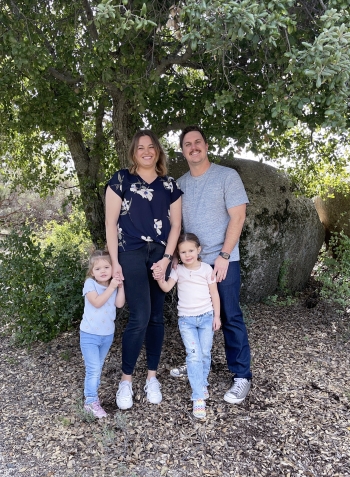

More than 40 million students in the U.S. have some college experience but no credentials. For many of those students, the answer to finally obtaining their degree is to transfer to a four-year school.
In the fall of 2023, nearly 14,000 new transfer students were admitted to Arizona State University. Of those, 10,000 chose to pursue a degree through ASU Online, with 2,100 hailing from California.
And as those West Coast students can likely attest, transferring to a degree-granting institution can be a huge, often insurmountable leap.

That's why Casey Evans, chief operating officer of EdPlus at ASU, which manages ASU Online, sees helping transfer students succeed in higher education as urgent and essential.
“Every year, the number of students who started but did not complete a college degree rises as they get sidelined by multiple factors that impact their lives,” she said.
Indeed, while the number of degree-seeking undergraduate students enrolled in postsecondary institutions as transfer students in 2021 was over 1.2 million nationwide, for every enrolled transfer student, nearly 37 more have stopped out, or left college, without earning a degree.
To paraphrase a famous California "dude," ASU simply could not abide that statistic.
With more than 150 undergraduate programs to choose from, the university offers transfer students ample opportunity to find one that will maximize the credits they have already accrued and take them over the finish line to their degree.
“ASU is a place where people can find a quality education at a research university that can truly accept them for who they are and what they bring to the table," Evans said. "We provide them an opportunity to finish what they started, and support them every step of the way.”
ASU Online reaches milestone of 100,000 graduates
Growing up, Mercedes Carter’s parents — who immigrated to California from Mexico with only a third-grade education — always stressed the importance and value of higher education to their children. Carter took their words to heart but couldn’t immediately pursue a degree after high school.
“In high school, I was already expecting my first son,” she said. “I was prepared to enter the Marines but had to make some tough choices.”
Over the next decade, Carter dedicated herself to supporting her growing family by working full time at a California vineyard. But she still dreamed of getting her college degree. With her husband's and parents' encouragement, Carter enrolled in a local community college, but eventually came to the point where she needed to transfer to continue her studies.

For Matthew Evans (no relation to Casey Evans), his path to a college degree was similarly unconventional. While other high school seniors were looking at degree programs, he was looking for work.
“My path has been kind of backward to most people,” Matthew said. “Most people go to college to get a degree and then try to find their career. I was kind of working on finding a career field while dabbling with college courses at the community college.”
Matthew explored his options with local businesses in northern San Diego County, but it wasn’t until he landed at the outdoor retailer REI that he discovered his love of merchandising and began to seek out a bachelor’s degree.
For both Carter and Matthew, ASU Online checked all the boxes.
“It was perfect,” Matthew said. “You could do it from home. You could do everything remotely. You could do it at your own pace. I work full time and I have two young kids, so life is crazy as it is. Not having to be at a class or on campus, I can watch the kids and be working on something. It was perfect.”
The most transfer-friendly degrees available through ASU Online include interdisciplinary studies, mass communication and media studies, and applied business and technology solutions. Majors run the gamut from liberal arts to science, technology, engineering and math (STEM), and students looking for a perfect fit can find it via ASU’s customizable degree options.
For Carter, balancing work, family and school was a struggle, but ASU Online provided the flexibility she needed to take the next step and finally accomplish her educational goals.
“I knew I wanted to study business administration,” she said. “I talked to my enrollment coach, and they asked if I’d be interested in interdisciplinary studies. I thought, sure! I could have a focus on business and also flexibility.”
Transfer students aren’t alone as they navigate the admissions process and the online learning experience; a suite of resources including student success coaches, enrollment coaches and academic advisors is available to assist all students. Support for transfer students also includes partnerships with companies like Starbucks and Uber, through which qualifying learners can take advantage of tuition scholarships.
As a leader focused on student success outcomes, Casey Evans emphasizes the importance of tailoring the learning experience to the needs of the student.
“Education is a very personal pursuit, and each of our students has unique needs and expectations for how the university supports them,” she said. “We work with the full suite of resources of ASU and our amazing coaches to build tools and technology to provide a truly personalized support structure that surrounds the student as they move along their educational journey.”

MyPath2ASU is one unique resource available to transfer students that helps them map out which college courses will transfer directly into ASU degree programs, including courses taken through community colleges within and without Arizona.
"ASU's charter requires us to develop approaches to serve all students, including students who have discontinued their studies at other institutions or are looking to explore our many world-class baccalaureate options that aren't otherwise available to them,” said ASU Vice Provost for Academic Alliances Cheryl Hyman. “In doing so, we have developed industry-leading technology, MyPath2ASU, and simplified our processes to make it as easy as possible to transfer students to pursue studies at ASU.”
Another resource, the Earned Admission program, powered by ASU’s Universal Learner Courses (ULCs), offers first-year college courses online and a path to meet aptitude requirements for university admission.
Matthew, whose GPA took a hit when he withdrew from several community college courses after the drop deadline, took advantage of ULCs. “My GPA was good enough to transfer in, it just wasn’t enough to get into my degree program,” he said.
By taking ULCs, Matthew was immediately immersed in university courses, demonstrated his commitment and academic ability and worked his way into the degree program of his choice. Today, Matthew works remotely for an Oregon-based business, where his love of merchandizing expanded into brand-building and community activation.
ASU was an early adopter of the student success coach model, which connects students with coaches who are invested in student outcomes. Coaches provide support, connect students with resources, and sometimes simply lend an ear.
In 2016, the success center was expanded to support the growing ASU Online student population and has evolved to continue providing additional resources and support.
“(The coaches’) work focuses on helping students to plan for success with things like time management strategies and tips, embracing the whole human as a student in a degree program,” Casey Evans said. “Their goal is to empower students with a multitude of resources and tools so that they have places to turn when things might be difficult so that they can overcome hurdles and achieve their goals.”
Video courtesy ASU Online
That comprehensive support model continues to adapt to student needs. In addition to success coaches, the success center now includes financial intake specialists, corporate partnership-focused success and career coaches, and re-entry coaches who, since their introduction in 2017, have helped thousands return to college, giving them another opportunity to finish their degrees.
All coaches provide answers and guidance to students. What sets them apart is that they also reach out to learners proactively. Their primary goal is to ensure each learner reaches their full potential personally and professionally throughout their academic journey. Sometimes that means picking up a phone or sending a text message.
It was through the support of her success coach that Carter persisted.
“The success coaches were wonderful to work with,” she said. “They checked in many times throughout the semesters and would be able to point me to resources to make my experience better. The most important challenge they assisted me in overcoming was navigating through each semester and helping me find resources, like student online support, study groups and other resources available to students.”
Although her journey was long, Carter, a first-generation college graduate, knows it was worth it.
“There were so many experiences that let me know I made the right choice,” she said. “I take pride in sharing my story to help encourage others to go after their dreams. My children can see that anything is possible when you set your mind to it and put in the work, and my parents have a sense of pride that with their support I accomplished my dream.”